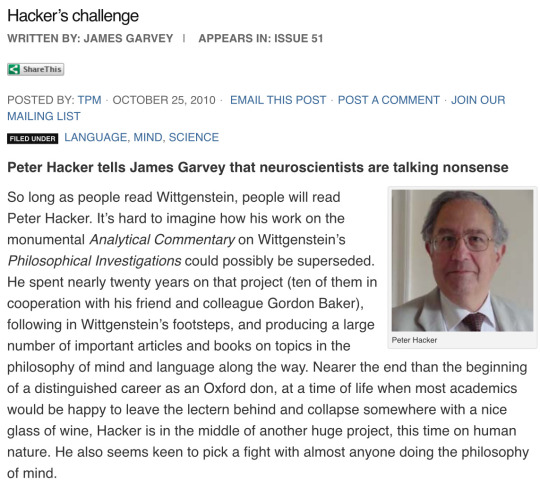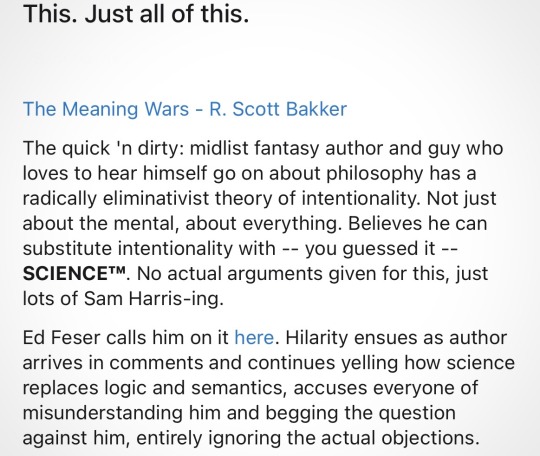#p.m.s. hacker
Explore tagged Tumblr posts
Text


If "the world doesn't have scaffolding", that's because it has walls, beams, a foundation, etc. Scaffolding can't be evaluated all on its own, even if it would be inappropriate to evaluate it as a replica of the building.
3 notes
·
View notes
Text


The fact that the "disappearance" of the brain can be accounted for phenomenologically as its own kind of absence undermines a lot of the rhetorical force of his "blind brain theory" from what I can remember. The way we are completely blind to whatever's going on in our visual cortex when we go about seeing things is presented as something fundamentally ominous, not just mysterious or as cause for wonder.
And it doesn't change the fact that we love and hate, make up our minds, pursue our aims, etc., to paraphrase P.M.S. Hacker.

Historically, my anxiety has been very susceptible to "everything you think you know is wrong" kind of talk and this isn't an exception. Even though I believe he's a latter-day sophist more than anything there's a part of me who would like to go back to some of his blog-posts and respond to some of his specific arguments, but that would be a different kind of challenge altogether than trying a barspin on a bike or something.
Among other things, I've seen other commentators accuse him of "gaslighting" before that term became widely abused, and even though he mocked those kinds of accusations I think they're not entirely off the mark.
Also, by chance I came across someone on here a few years ago who bought his philosophical doomsday rhetoric completely, and that was just awful.
(I don't think highly of the community I got that screenshot from at all btw, it just saves me the trouble of summarizing it myself).
4 notes
·
View notes
Link
0 notes
Text
Hacker is so pissed off at Conant in this paper, it's hilarious. Wittgenstein scholarship is srs bsns.
0 notes
Text
Beliefs (i.e. believings) are not dispositions to behave. Dispositions are essentially characterized by what they are dispositions to do, beliefs are essentially characterized by reference to what is believed to be so. But one can know that A believes that p without knowing what, if anything, A is prone or liable to do. The utterance “I believe that p but it is not the case that p” is a kind of contradiction. But “I have a disposition (I tend, am inclined or prone) to V, but it is not the case that p” is not a contradiction of any kind. If A believes that p, then it follows that A is right if p and wrong if not-p, but no such thing follows from A’s having a behavioural disposition, tendency or proneness.
Quine compounds his errors by identifying a disposition with its vehicle, claiming that the human dispositions are physiological states of the body or brain. But a disposition, no matter whether an inanimate one or a human one, is never identical with its vehicle, any more than an ability is identical with the structures that make it possible. The horsepower of the car is not beneath its bonnet, and the intoxicative power of whisky is neither lighter nor heavier than the constituent alcohol that is its vehicle. So even if it were true that believing that p is a disposition, proneness or tendency, it would not follow that it is identical with a neural state. For were believing that p identical with a neural state, one would be able to say “I believe that p (referring thus to one’s neural state), but it is not the case that p”.
P.M.S. Hacker, "Passing by the Naturalistic Turn"
Moore's Paradox - "It's raining, but I don't believe that it's raining"
2 notes
·
View notes
Text


M. Jackson Marr, The Escape of Metaphysics: Commentary on Burgos
#m. jackson marr#ludwig wittgenstein#pms hacker#behaviorism#psychology#mind#common sense#intentionality#peter hacker#p.m.s. hacker
0 notes
Text
I'm probably getting a book on neuroscience and philosophy for Christmas which is basically a tag team debate pitting P.M.S. Hacker and Max Bennett against Daniel Dennett and John Searle. I haven't read enough of the latter and basically have an emotional investment in Hacker and Bennett's philosophy tbh and need to challenge myself. They're mostly known for criticizing the philosophical assumptions cognitive (neuro)scientists make, but there's an overlooked positive aspect to their thought where they draw on Aristote's view of the soul/psyche to argue that we are fundamentally human persons as opposed to "brains piloting meat puppets" (which they argue is just a modernized version of the view that we are immaterial spirits who just so happen to have a body in this mortal plane we're occupying). Unfortunately (with maybe an exception for Dennett) they can be pretty blunt if not outright harsh and arrogant in their criticisms, and I'm not sure if I'm ready for that. The one analytic philosopher I've been reading this past year (David Woodruff Smith) is surprisingly gentle and empathetic when it comes to disagreements and I really wish more philosophers were like that.
9 notes
·
View notes
Text
It is mistaken to suppose that human beings are 'embodied' at all - that conception belongs to the Platonic, Augustinian, and Cartesian tradition that should be repudiated. It would be far better to say, with Aristotle, that human beings are ensouled creatures (empsuchos) - animals endowed with such capacities that confer upon them, in the form of life that is natural to them, the status of persons.
P.M.S Hacker, Neuroscience and Philosophy
4 notes
·
View notes
Text

P.M.S. Hacker, Wittgenstein
(William Lane Craig and others actually do argue that animals feel pain without knowing it).
1 note
·
View note